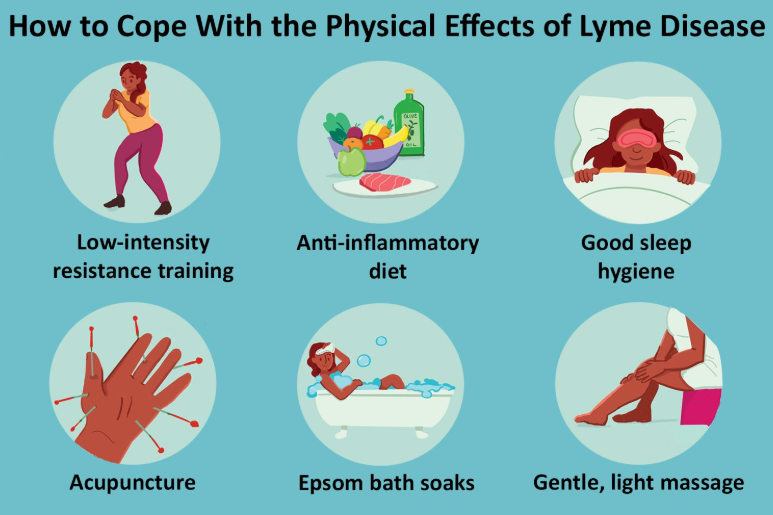Chronic Lyme Disease
Long-Term Symptoms and Management


If you have chronic Lyme disease, it can be quite daunting especially since there are some symptoms that would exist even after the treatment is done. The pain, the mental block, and the wait to get back to normal are all frustrating. But you can try and learn about these long-term symptoms and learn about how they can be managed in the better course of time. In this blog, we will discuss some of the symptoms followed by the steps one needs to follow to live a better and healthy life with chronic Lyme disease.
What Are the Long-Term Symptoms of Chronic Lyme Disease?
The long term symptoms of having chronic lyme would be severe fatigue, pain in the joints, impaired memory, and nerve damage. Most patients continue to experience these symptoms even after treatment and medications. These symptoms might take a long time to get better and at times years.
When Lyme disease becomes chronic, it leads to persistent inflammation in different regions of the body. Lyme arthritis may cause intermittent pains and stiffness of joints resulting in reduced physical mobility. Sometimes, depression becomes such an impediment to normal activity, that undertaking really simple tasks stamina saps from very many people.
Cognitive symptoms like brain fog, trouble concentrating and memory loss can also affect work and social life. Appreciating these symptoms enables the patient to commence seeking appropriate management and strategies for maintaining reasonable functioning.
How Does Chronic Lyme Disease Affect Daily Life?
Chronic Lyme effects can make everyday tasks difficult, causing pain, fatigue, and emotional challenges like anxiety and depression. These symptoms often disrupt work, hobbies, and relationships.
Living with Lyme means adapting to physical and mental limitations. Persistent fatigue can make it hard to stay productive, while joint pain might prevent you from enjoying physical activities like walking, gardening, or sports.
Emotional health is also affected; the unpredictability of flare-ups often leads to frustration and feelings of isolation. Relationships with family and friends may be strained as others struggle to understand the ongoing challenges. Seeking support from healthcare providers, loved ones, and support groups can make managing these difficulties more bearable.
What Are Effective Ways to Manage Chronic Lyme Disease?
Managing chronic Lyme disease involves combining medical treatments like antibiotics with lifestyle changes, physical therapy, and complementary therapies such as acupuncture.
A comprehensive management plan starts with the right medical care. While antibiotics may address residual bacterial activity, symptoms like joint pain and fatigue often require additional support. Anti-inflammatory diets can reduce discomfort, while gentle exercises like swimming or yoga can improve strength and flexibility without overexerting the body.
Stress management techniques such as meditation, deep breathing, or journaling help maintain emotional balance. Complementary therapies, like acupuncture or massage, may also provide relief. Partnering with a healthcare team to develop a tailored treatment plan is the key to long-term management.

Can Chronic Lyme Cause Mental Health Issues?
Yes, chronic Lyme effects frequently include mental health issues like anxiety, depression, and brain fog. These occur because the disease affects the brain and nervous system, causing chemical and functional imbalances.
Lyme illness doesn’t just impact your body—it also takes a toll on your mind. Inflammation caused by the disease can interfere with neurotransmitters, leading to mood swings and cognitive difficulties. The stress of living with ongoing symptoms often amplifies feelings of sadness or worry. Over time, people with chronic Lyme may feel isolated, misunderstood, or hopeless. Mental health therapies, such as Cognitive-Behavioral Therapy (CBT), mindfulness practices, or group counseling, can help restore emotional well-being and build resilience.
Are There Specific Diets to Help Manage Chronic Lyme Disease?
An anti-inflammatory diet, rich in foods like berries, turmeric, leafy greens, and omega-3-rich sources like salmon, can help manage chronic Lyme disease symptoms. Avoiding processed foods, refined sugars, and trans fats is equally important.
Inflammation is a major driver of symptoms in chronic Lyme illness, so reducing it through diet can bring relief. Incorporating antioxidant-rich fruits and vegetables helps combat oxidative stress, while healthy fats like those in avocados and nuts support brain and nerve health. Probiotics from yogurt or fermented foods like kimchi improve gut health, which can be compromised by prolonged antibiotic use. Staying hydrated and avoiding caffeine or alcohol also supports better energy levels and overall health. Consulting with a nutritionist can personalize your diet to address specific symptoms.

Is Chronic Lyme Disease Curable?
While chronic Lyme disease is not always curable, it is manageable with consistent care. Early intervention and a multi-faceted approach improve outcomes and can significantly reduce symptoms.
In cases where antibiotics fail to eliminate all symptoms, chronic Lyme requires long-term management. Medications may address specific issues like pain or inflammation, while therapies like physical rehabilitation can restore mobility. Psychological support, lifestyle changes, and nutritional adjustments can also enhance overall well-being. Although the road to improvement can be slow, many individuals regain a significant level of functionality and lead fulfilling lives with the right care.
What Are the Risks of Ignoring Chronic Lyme Disease Symptoms?
Ignoring long-term Lyme disease symptoms can lead to serious complications such as joint deformities, neurological damage, or heart problems. Early treatment can prevent these outcomes.
Lyme disease doesn’t go away on its own. Without proper management, symptoms like joint inflammation can progress to arthritis, causing permanent damage. Neurological problems such as peripheral neuropathy or cognitive decline can also worsen, reducing quality of life. In rare cases, untreated Lyme illness may affect the heart, leading to Lyme carditis, a potentially life-threatening condition. Seeking prompt medical advice ensures the best chance to control the disease and prevent irreversible damage.
Conclusion
Dealing with chronic Lyme disease is undoubtedly challenging, but it’s important to remember that improvement is possible. By recognizing symptoms, adopting healthy habits, and working closely with healthcare providers, you can take control of your condition. Over time, even small changes like eating nutritious meals, practicing stress relief, and building a strong support system can lead to big improvements.
Remember, you’re not alone on this journey. With the right care and determination, you can live a fulfilling life while managing Lyme illness. Stay proactive, stay informed, and don’t hesitate to seek help when you need it.
